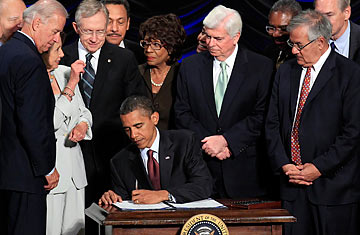
President Barack Obama signs the Dodd-Frank Wall Street Reform and Consumer Protection Act in Washington on July 21, 2010
Let me start with a few words I don't say very often: I was wrong.
Let me add a few words I say even less often: I'm glad I was wrong.
President Obama signed a sweeping Wall Street reform bill July 21, something I stubbornly insisted was unlikely to happen, even when my sources assured me it was virtually certain to happen. Oh, I hedged myself better than Lehman Brothers did — I said passage was "certainly possible" — and I was just one vote in the Senate away from saying a few words that my wife knows I say irritatingly often: I told you so. But I'm eating crow today, and that's good for the country as well as my wife. I didn't expect the bill to be this tough, either.
This is an extraordinary victory for Obama — along with punching-bag Treasury Secretary Timothy Geithner, lame-duck Senator Christopher Dodd and lightning-rod Congressman Barney Frank — over the combined forces of Big Finance and the Republican Party. Politically, it makes Obama and congressional Democrats look like strong and effective defenders of Main Street. It makes all but a few Republicans look like bought-and-sold water carriers for Wall Street — and losers to boot. The details of financial reform are complex, but not so complex that the voters will all forget by November which team supported a strong new consumer-protection agency and which team preferred the Wild West status quo for mortgage and credit cards, which team stood with the banks after the worst financial meltdown since the Great Depression and which team stood for change.
But this isn't just a political score. This is a huge policy achievement, a strong blueprint from the Obama Administration that actually got stronger as it wound its way through the sausage factory on Capitol Hill.
Most of Obama's best proposals survived the legislative process. I've been a cheerleader for the idea of a new consumer agency to police the financial world, and the deal to house it at the Federal Reserve shouldn't affect its independence. The new Financial Stability Oversight Council should help monitor systemic risks by encouraging regulators to think beyond their narrow silos. And the new resolution authority should help the government put failed behemoths to death without endangering global finance; Republicans are calling it a bailout provision, but it's really a tool that officials can use instead of a bailout.
Obama's plan was full of sensible responses to the last meltdown. It cracked down on the mortgage industry, taking aim at "liar loans" handed to borrowers with no income by lenders with no skin in the game. Most derivatives will now be traded through regulated clearinghouses, so markets can see what they're worth and who's at risk. There were new protections for investors, new restrictions for hedge funds and lots of other excellent proposals that will now be the law of the land.
My original gripe with the plan was that it wouldn't have done enough to prevent another meltdown. My top priority would be much tougher capital requirements and leverage restrictions to rein in the Wall Street casino so that financial firms could no longer place bets 30 times the size of the assets that back them. My second priority would be absolute limits on bank size, because you can't get too big to fail if you can't get too big — and if you can get too big, then when you do fail, you're going to get bailed out, no matter what Congress says in 2010. My third priority would be to eviscerate the ratings agencies that kept slapping happy-face stickers on financial crud. The Obama plan did a lot of good stuff, just not that stuff.
